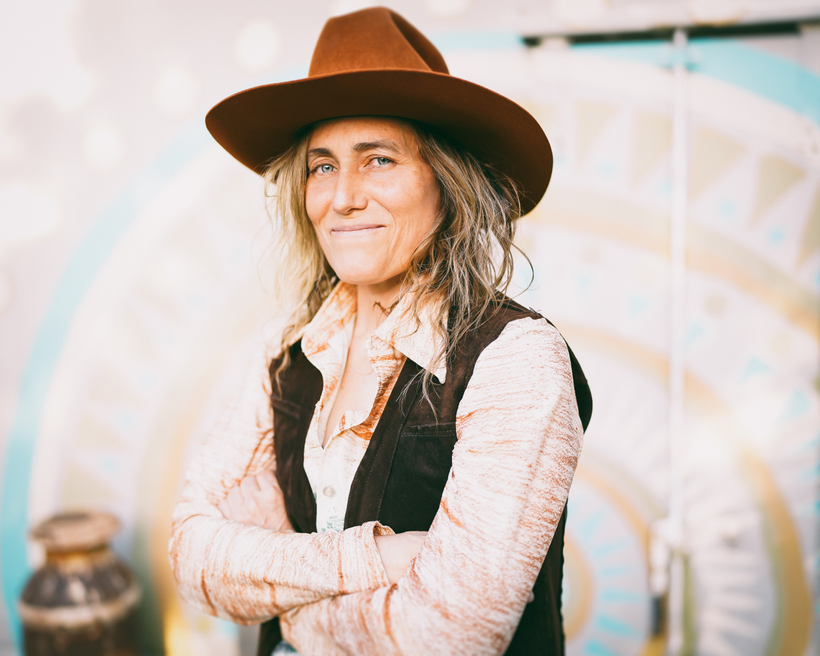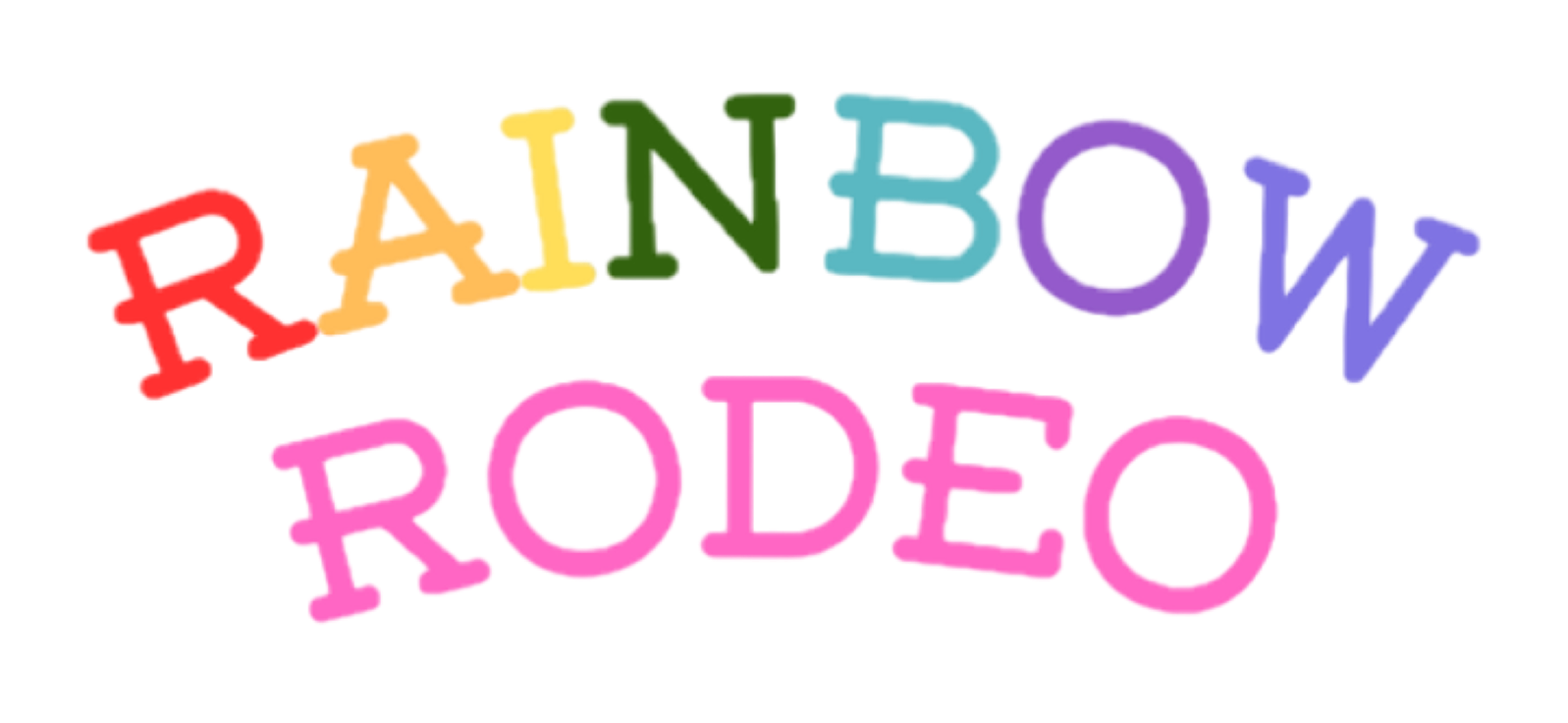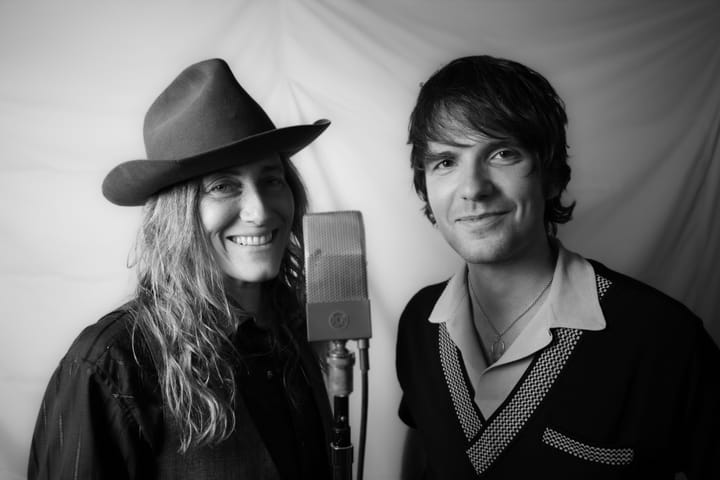Julian Talamantez Brolaski Interviews Melissa Carper

Howdy, cowpokes! We’re in the midst of raising funds for issue 3 of Rainbow Rodeo! Subscribe to our Patreon to read the full interview! This excerpt was published in the Rainbow Rodeo newsletter in December 2022.
Melissa Carper released her latest album, Ramblin’ Soul. right before the holiday. Carper has made an art of sassy, vintage-style country music, both in her work as a solo artist and her rollicking band Sad Daddy. Ramblin’ Soul has a lightness to it that also demonstrates Carper’s songwriting power. (I reviewed it in No Depression.)

But there’s nothing better than letting two artists riff off each other, so I asked Julian Talamantez Brolaski to interview her. Julian’s the lead singer of Juan and the Pines, and will be releasing their next album in August 2023. They got on the horn with Melissa while she was, well, rambling.
You can read the full newsletter (with links and stuff) here.
Julian: Since you mentioned you’re driving, what kind of vehicle are you driving right now?
Melissa Carper: I have a Toyota Sienna van. It’s a 2007 minivan.
Julian: I ask because you have a history of writing about vehicles, “My Old Chevy Van,” and on your new album, “1980 Dodge Van.” Is there gonna be a Toyota Sienna song? [laughs]
Melissa Carper: I’m not gonna be writing a song about this Toyota Sienna. They just don’t make cars as cool as they used to.
Julian: So yeah, it’s not as romantic as the old Chevy van.
Melissa: No, it’s not.

Julian: And I remember the song with the line, “I’ll never sell Sue,” which I think was about like an old truck.
Melissa Carper: Yeah. So you’ve listened to the Buffalo Gals band album as well. Cause that’s on Where the Heart Wants to Go.
Julian: Yeah, so I was just kind of curious if you had anything to say about the car or the truck or the van as a literal vehicle for the song. I mean, cuz they’re often like, you know, like personified as female, like a ship or like an ex-girlfriend….
Melissa Carper: I think, yeah. I feel like, you know, they can feel like you’re home, especially a van. And the kind of big van where you’re living in it, sleeping in it. I think a lot of people can relate to that. They get attached to the vehicle just like you would a home. And if it’s a family van, then you have all those memories too, of like growing up and, and your family. That’s what makes the van song special really is that they were family vans. And they have all of that history and all those memories in them. So I feel like it’s less about the van than it’s about everything that happened in the van and, you know, all your memories associated with that. And of course the old cars are so cool. That kind of feeling where you miss that cool car you had.
Julian: Yeah. I used to have a 78 Chevy truck and it had two gas tanks
Melissa Carper: That’s amazing.
Julian: It was pretty awesome. And I think that goes very well, like with the ethos of the rambling lifestyle where even your home can ramble, you know?
Melissa Carper: That’s right. Yeah.
Julian: I read that you were living on a vegetable farm in Texas. Is that still where you’re living?
Melissa Carper: Yeah, I am. Me and my girlfriend, Rebecca who’s in the Buffalo Gals, and she plays in my band too, and in Sad Daddy. We lived on an organic veggie farm. That’s close to Bastrop, which is just like 40 miles east of Austin. And we rent a tiny house. When we first moved back there during Covid, we did work-trade to stay there because we didn’t have very many gigs, but now we’re just paying rent to stay there.
Julian: Yeah. How wonderful to live, where your food is grown and too, and to be part of making it grow.
Melissa Carper: Yeah, it’s pretty cool. Yeah. It’s kind of what I’ve always dreamed of, having a little farm, but for now renting on somebody’s farm is good.
Julian: Yeah, that sounds pretty close to the dream. And you all the troubles of trying to run a farm.
Melissa Carper: I wouldn’t be able to do both. When I’m tourin and stuff, I can’t even keep a little garden alive.
Julian: Well, I’m curious to talk with you about your songwriting. On the song descriptions for the new album you talked about “receiving” the song “I Don’t Need to Cry” rather than writing it. And as a songwriter myself, I’m aware that sometimes they come really easy and sometimes they don’t and sometimes you write ’em over years and years. I hear so many different things in your songs and you know, all those influences from like the Carter family, Hank Williams, Jimmie Rodgers, Western swing. And there’s a song “Old Sweet Home.” I think that’s on Brand New Old Times Songs. The last line in the melody or in the instrumental parts kind of reminds me of “Faded Love.” “I remember our faded love,” by Patsy Cline. And it got me thinking, there’s only so many melodies in this world.
Melissa Carper: I think whether you’re conscious of it or not, you’re always kinda, you know, stealing something, something you’ve heard before.
Julian: Yeah, exactly. And so it’s really just feels like it’s operating in the folk tradition in that way. So I’m wondering if you had ever done that on purpose. You know, like where you take old melodies….
Melissa Carper: I consciously used bits of melodies from an old song on “Old Sweet Home.” I was writing a melody on the banjo first, and then I put words to it, and it felt kinda like the melody was an old melody. You know, it didn’t feel like something I’d really come up with on my own but it felt like a really pretty melody. I actually very rarely do that where I’ll have a melody first and then I’ll write words. Usually I’ll have a little lyric and then I’ll write the melody. There’s been some songs–“Old Fashioned Gal” is one of them–where I used a Jimmie Rodgers melody for the very first line. And then I kind of got away from it.
Julian: Oh, what Jimmie Rodgers song?
Melissa Carper: “Travelin Blues” I believe is the title of it. It goes, “I had a dream last night, I thought my good girl had gone.” So I used the melody [of that first line] for “my old fashion gal”. And I did that on purpose. Cause at the moment when I was writing it, I didn’t how to start this song. And I was just like, okay, I’ll just steal a Jimmie Rodgers melody…. The interesting thing about Jimmie Rodgers too is, a lot of people don’t know, his songs were co-written by a lady named Elsie McWilliams. So a lot of the songs that people just attribute to Jimmie Rodgers were co-writes. She didn’t care if she got credit. She was like a teacher, she wanted to help him out. I think she understood music theory more than he did. She got into the Country Music Hall of Fame I think a long a time ago, and she’s been recognized, but a lot of people still don’t know that about her.
Julian: I wanted to also ask you about this idea of the term “queer country.” You have some songs about being gay. Maybe this is a weird question, but I wonder if there’s a difference between gay country and queer country? And I wonder if you resonate with the term “queer country” or “queer” in general.
Melissa Carper: I honestly, haven’t been wanting to think about it too much. I don’t like labels and I don’t like being labeled. I’ll be happy when we come to a time where it’s just normal, you know? But I do understand why we have to talk about it at this point, because we feel we can feel so alienated, especially from traditional country music. So when I write songs like “Pray the Gay Away” or or “Christian Girlfriend,” I’m just writing for my own experience and kinda writing a song that I hope helps people. For them being able to hear what it was like growing up and not feeling like I could tell anybody I was gay, you know? And I know the world is changing and getting easier, but I write those songs just because that’s what I’ve gone through and, a lot of my stuff I write is from personal experience.
Julian: Yeah. I hear you. I asked because this is for a gay country magazine. And it’s almost like “queer country” is emerging as a sub-genre. And I don’t know if it’s to do with being excluded from some other kind of scene or whether it’s like deliberately making its own way?
Melissa Carper: Well, I think it’s cool to celebrate it and, and you know, I’m all for that. I think it’s great. I would like to be included in that, and in just the regular old broad genre of Americana music. But I think it’s great to celebrate it. I think we need that.
You can read more about Melissa’s inspirations and Julian’s yodeling technique when you subscribe to the Patreon!




